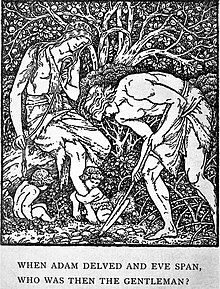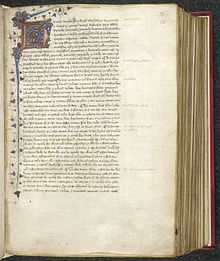John and William Merfold
[7] As the economy shrank, national exports, which had reached a peak in the 1440s, fell by half within two decades, and a collapse in the overseas trade of wool caused its price to fall.[12] In East Anglia, surviving records such as articles of impeachment from 1449 to 1450 against William, Duke of Suffolk, suggest that he used his access to the courts and regime to oppress his tenants and advance himself personally.[13] These injustices and what the medieval historian A. J. Pollard has described as the "systematic abuse of power in the king's name" were worst in Kent,[14] but also occurred in Sussex and elsewhere in southern England, and led to a series of insurrections.[16] In May 1450, a major rebellion by the men of Kent led by Jack Cade marched towards London, forcing the king to retreat to Kenilworth Castle in Warwickshire.On 26 July 1450[23]—a fortnight after Cade's death—or possibly earlier,[24] John and William Merfold, who were "small scale victuallers" from Salehurst in East Sussex,[25] stated in a public market that the king was a "natural fool"[26] and should be deposed:[note 1] In August, William Howell of Sutton encouraged men from the towns of Chichester, Bramber, and Steyning to join him in rebellion, and asked that constables and their men join him after "Seynt Bartolomew's day," 27 August."[32] According to Tedj Ghomri, "The Sussex revolts of 1450–1451 incited by the Merfolds had no such faith in the established social order, and threatened to specifically target lords, bishops, priests, and even the king."[33] Historian David Rollison has argued that the socially and politically radical statements by the Merfolds support the hypothesis that the uprisings were motivated by longstanding class antagonisms.[34] Rollison follows contentions by social historian Andy Wood and the 15th-century English jurist Sir John Fortescue, who argue that the economic recession of the mid-15th century only magnified routine class antagonisms between village communities and the gentry.[35] Court rolls from Sussex during the period often mention tenant poverty, inability to pay fines or taxes, and abandonment or land or livestock.


William MorrisA Dream of John BallyeomenSussexindictednobilityclergydepositionHenry VIJack CadeBlack Deatheconomy were depressedEnglandGreat Slumpsilver minesHanseatic LeagueembargoFlemishBurgundyHundred Years WarGasconyJack Cade's RebellionOld Kent RoadHenry VI of EnglandchevageEast AngliaarticlesimpeachmentWilliam, Duke of SuffolkA. J. Pollardled by Jack CadeKenilworth CastleWarwickshiremilitiaHouse of CommonsRoll of Parliamentclemencypardonsput on trialquarteredArchbishop of CanterburyJohn KempDuke of BuckinghamvictuallersSalehurstEast SussexChichesterBramberSteyningBartolomewEastbourneHorshamRobertsbridgeWealdenHastingsEasterRotherfieldMayfieldBurwashskilled craft workershusbandmenPeasants' Revoltmanifestosocial historianAndy WoodSir John FortescueMagna CartaseigneurialCourt rollsLollardTenterdenThe English Historical ReviewDay, JohnPast & PresentHare, J.N.The Economic History ReviewHicks, MichaelHistory Workshop JournalPeasant revolts in medieval and early modern EuropeBagaudaeStellingaRebellions of Basil the Copper HandUprising of IvayloPeasant revolt in Flanders 1323–28St. George's Night UprisingJacquerieCiompi RevoltPeasants' Revolt in EnglandHarelleCabochien RevoltTransylvanian peasant revoltFunen and Jutland Peasant rebellionsJohn and William Merfold's uprisingCarinthian Peasant RevoltFriulian Revolt of 1511Poor ConradDózsa rebellionSlovene peasant revolt of 1515Arumer Zwarte HoopGerman Peasants' WarDalecarlian RebellionsPalatine Peasants' WarSkipper Clement's RebellionOpryshkyDacke WarKett's RebellionCudgel WarCroatian–Slovene Peasant RevoltIvan Bolotnikov's RebellionPeasants' War in Upper AustriaKostka-Napierski UprisingMorning Star RebellionSwiss peasant war of 1653Stenka Razin UprisingBulavin RebellionDalecarlian Rebellion (1743)Pugachev's RebellionRevolt of Horea, Cloșca and CrișanGreat FearSaxon Peasants' RevoltPeasants' War (1798)